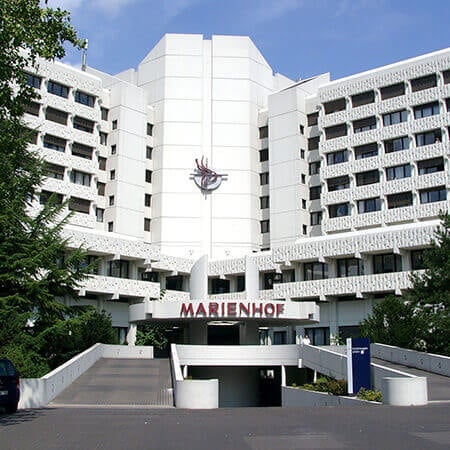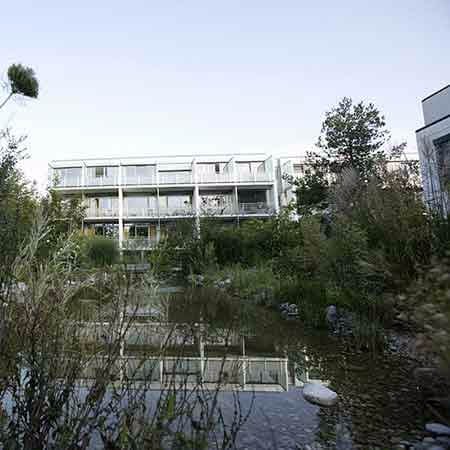Bladder cancer
Bladder cancer incidence accounts for 3-4% in the structure of malignant neoplasms. This type of cancer affects males 3-4 times more often than females. The disease is more common among patients of an elderly age. Only 5% of patients are diagnosed with bladder cancer before the age of 45.
The Booking Health portal presents 81 German clinics specializing in bladder cancer treatment
Show all clinicsBladder cancer – Diagnostics
Bladder cancer can be suspected with a digital rectal examination (presence of the palpable malformation) and laboratory diagnostics (blood in the urine). A cytological examination of urine sediment is also possible.
Main diagnostics methods:
- Ultrasound examination helps to detect the malformation in the bladder.
- Excretory urography with descending cystography. The patient drinks a contrasting liquid, which is excreted with the urine. This helps to receive a clear picture of the urinary tract structure. Then an X-ray picture is made that can further detect signs of bladder cancer.
- Cystoscopy with a biopsy is an endoscopic examination method. An optical system and surgical instruments are inserted through the urethra into the bladder. Mucosal biopsy is taken from the suspicious areas for a subsequent cytological examination.
- Transurethral resection of the bladder. The method is used as treatment method at the first stage of the pathological process and as a diagnostics measure at the latter stages. The portion of the bladder with tumor is removed through the urethra. According to its degree of invasion into the organ wall, the stage of the disease process is determined.
- CT or MRI. It is used for detection of the tumor itself and its metastases. It allows doctor to specify the location of the tumor and the nature of its growth.
- Gastroscopy and colonoscopy. These methods presuppose the endoscopic examination of the stomach and intestines, which are indicated while planning the radical cystectomy (bladder removal).
- Pelvic angiography is an X-ray method, which implies the injection of contrast medium into the blood vessels. It is used in the cases of a suspected tumor invasion into major arteries or veins.
Best clinics for the bladder cancer diagnostics in Germany:
Bladder cancer – Treatment
The main method of treatment in the case of bladder cancer is surgery. Organ sparing techniques are used if possible. Basic treatment methods are:
- Transurethral resection of the bladder. The operation is performed with the access through the urethra. At first, the exophytic area of the tumor (that is growing into the bladder lumen) is removed and then its base. To prevent the cancer relapse, the doctor also removes 1-2 centimetres of the healthy mucosa.
- Radical cystectomy with lymphadenectomy. It is indicated in cases when the cancer is invasive. Bladder and regional lymph nodes are completely removed. Men may undergo the removal of the prostate and seminal vesicles, while women undergo the removal of the uterus with appendages, and the front wall of the vagina.
- Bladder reconstruction is performed together with the cystectomy. A patient will have to use the special bag to collect urine without this operation.
- Chemotherapy and radiation therapy are additional to the surgical treatment methods. They can also be applied without surgery if the tumor is inoperable or there are contraindications to the surgery.
- Intravesical immunotherapy. Regular injection of the BCG vaccine into the urinary bladder increases the survival of patients after transurethral resection of the bladder.
The costs for the treatment in the specialized cancer centers in Germany are as follows:
- The cost of radical cystectomy with bladder reconstruction for bladder cancer is between 31,300 EUR and 54,200 EUR.
- The cost of treatment with partial or total resection with neourethra formation is between 29,600 EUR and 51,100 EUR.
- The average cost of treating bladder cancer with embolization or chemoembolization is between 24,300 EUR and 41,400 EUR.
Bladder cancer – Innovative treatment
New methods of treatment are constantly being developed. In the recent years the following therapeutic techniques have been introduced:
- Robotic surgery. Cystectomy performed with the help of a robot can significantly reduce tissue trauma. Also, it reduces the intraoperative mortality rate of patients and risk of postoperative complications.
- Photodynamic therapy. Photosensitive medications are administered to the patient for several days. They are selectively accumulated in tumor tissues. Then, the cystoscope is inserted into the bladder and with its help the cells are irradiated with a wave of the desired length. The wave is maximally absorbed by the accumulated in the tumor tissue dye. The advantage of this method is the possibility to destroy the cancer cells without affecting the healthy tissues. The disadvantage is the impossibility of the light waves penetration into the depth of the affected organ. Therefore, only the part of the tumor that is located no deeper than the bladder mucosa can be destroyed.
- Gene therapy. A special virus, which infects tumor cells, is placed inside the bladder. It embeds into the DNA of the tumor cells. After that, the immune system recognizes and destroys these cells.
Treatment of stage 4 bladder cancer
Contrary to popular belief, stage 4 bladder cancer can be diagnosed not only in the presence of distant metastases. Patients with significant local tumor spread may receive this diagnosis as well. In this case, the main treatment for stage 4 bladder cancer is radiation therapy and chemotherapy. If the tumor shrinks significantly, doctors may perform radical surgery to try to cure a patient with terminal cancer. Even if the cancer recurs over time, surgery provides the best survival rates for patients.
When distant metastases spread, the treatment of stage 4 bladder cancer is based on systemic therapy. Chemotherapy is the main way to control the tumor. Immunotherapy can also be used for some patients. Targeted therapy in the treatment of stage 4 bladder cancer is so far used only as part of clinical trials.
Immunotherapy for bladder cancer treatment
Local immunotherapy treatment for bladder cancer can be carried out at an early stage. It involves the introduction of drugs into the lumen of the organ. This is usually a BCG vaccine, less often a virus that produces interferon alpha-2b.
Advanced stages are treated with systemic immunotherapy. Most often, these are PD-1 and PD-L1 inhibitors, which enhance the body's immune response against cancer cells. When treating stage 4 cancer, they are used:
- As a second-line therapy if chemotherapy does not work
- As a first-line therapy if chemotherapy is contraindicated
- As a maintenance treatment after completing all cycles of chemotherapy
Immune checkpoint inhibitors can sometimes be used for the early stages of cancer. These can be prescribed if intravesical BCG therapy does not give a sufficient effect and there is a high risk of relapse after bladder removal surgery.
Antibody-drug conjugates are used as part of immunotherapy for bladder cancer in developed countries. These are monoclonal antibodies to nectin-4 or Trop-2, to which chemotherapy drugs are added. Antibodies deliver cytotoxic drugs directly to cancer cells. The treatment method is used as a third-line therapy after chemotherapy and PD-1/PD-L1 inhibitors.
In clinical trials, other types of immunotherapy are used for the treatment of bladder cancer, such as vaccination, dendritic cells, and oncolytic viruses.
Best clinics for the bladder cancer treatment in Germany:

University Hospital of Ludwig Maximilian University of Munich
40495.62
40603.15

Helios Hospital Berlin-Buch
35986.58
34229.53

Catholic Clinic Koblenz-Montabaur
36348.85
33846.38
Bladder cancer – Rehabilitation
Most patients require rehabilitation after the treatment of complex oncological diseases. It includes the following aspects:
- Prevention of complications that may occur as a result of treatment. It can be pneumonia, lymphostasis, thromboembolic or infectious complications.
- Restoration of general health. The elimination of the consequences after surgeries and chemotherapy is carried out. The functions of internal organs are restored with the help of various medical and rehabilitation measures.
- Restoration of occupation. A person must not just stay alive. He must have physical and intellectual capabilities, which are sufficient for employment.
- Psychological support. First of all, it is required for patients, whose occupational performance was harmed because of the disease. Patients with deterioration of appearance also will benefit from psychological help.
- Restoration of appearance. If necessary, you can use surgical and other methods in Germany to restore appearance defects caused by cancer. For example, to carry out the reconstruction of the breast.
- Social and domestic rehabilitation. A person with reduced workability is trained to act in the society and perform everyday tasks in new conditions.
In German clinics, rehabilitation is carried out in a comprehensive manner. The patients are provided with qualitative care here. Doctors' monitoring and conservative treatment allow to avoid complications, which usually happen after treatment of oncological diseases. Psychotherapy, physiotherapy and physical therapy are actively used in Germany.
Specialists in different medical spheres take part in the rehabilitation process. These are massage therapists, speech therapists, specialists in physiotherapy exercises, physiotherapists. Social and occupational therapy is carried out, as well. If necessary, people are taught how to eat properly, take care of a urostomy, etc.
In Germany, rehabilitation is carried out with the maximum level of comfort for the patient. A person feels the results quite quickly and it improves his motivation and promotes further recovery.
Best clinics for oncological rehabilitation in Germany:
Author:
The article was edited by medical expert, board certified Dr. Nadezhda Ivanisova. For the treatment of the conditions referred to in the article you must consult a doctor; the information in the article is not intended for self-medication!
Source:
The cost of services includes
Here you can find the cost of treatment for this disease at the German University Hospitals. Leave a request and we will provide a free consultation with a doctor and will start organizing the whole treatment process.
The program includes the following:
- Issuing of an invitation for getting a visa for treatment as quick as possible
- Fixing an appointment at a time convenient for you
- Preliminary organization of a comprehensive examination and discussion of the forthcoming treatment plan
- Arranging transfer from the airport to the hospital and back to the airport
- Provision of interpreting services and services of a personal medical coordinator
- If necessary, assistance in the organization of further surgical treatment
- Provision of a medical insurance against treatment complications covering up to 200,000 euro
- Preparation and translation of medical records and recommendations from the hospital
- Assistance in the subsequent communication with your attending physician, including consultations on repeated X-ray images through the unique medical document management system E-doc



